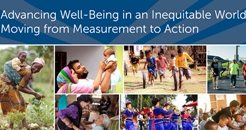 Advancing well-being in an inequitable world - 1
Advancing well-being in an inequitable world - 1
From a report by the Robert Wood Johnson Foundation
What can we learn from multiple countries about advancing well-being—a notion of health that extends beyond the absence of disease?
Well-being—the comprehensive view of how people are doing and the condition of their community, society, and environment—is increasingly being used around the world as a measure of progress. Well-being metrics provide a more nuanced and predictive view than purely economic measures, illuminating conditions of inequity and despair that other tools mask, and expanding the notion of health far beyond absence of disease.
While measuring well-being is valuable, the real opportunity may lie in applying well-being data and concepts as a driver for action, informing practice shifts, policy and systemic change, and resource allocation, and ultimately creating a new definition of what matters.
The Robert Wood Johnson Foundation (RWJF) convened an international group of thought leaders to explore how countries and cities can accelerate translation of well-being measurement data into meaningful action to advance well-being and increase equity. The group included practitioners who shared case studies and real-world experience, academics who shared theoretical insights, and a host of other leaders from diverse and complementary perspectives.
They shared proceedings in a paper which shares case studies and insights. The overarching takeaway from the event was an immense need to radically expand the definition of progress to include well-being as a complement to economic vitality and other measures.
Here are a set of identified tangible actions that are already propelling that shift and that can be scaled up:
A shift to well-being can begin anywhere and is rarely linear, so start now, where you can, and iterate rapidly. Practitioners across sectors need safe space to experiment and collaborate in new ways. The best approach is often to pilot and prove promising practices at the community level, and create channels for government to learn and take up what works.
Recognize that a well-being approach varies greatly in different places and contexts. Understanding cultural context, experiences, power dynamics, and other variables is vital in creating well-being measures, interpreting what they say, and taking action that will work in the specific context.
Commit to a future-looking, intergenerational approach. Well-being’s future orientation—centered on proactive action, prevention, and sustainable use of resources—demands intergenerational leadership.
Recognize the power of measurement beyond data alone. Having the right data not only informs action, it plays a vital role in shaping the narrative. The strongest measures will be simple and relevant to everyday people, not just elites, but not overly simplistic or reduced to one number.
Create a shift in individual consciousness among influencers. People raised to see wealth as the singular marker of progress—and spending every day hearing narratives and living in systems that reinforce that status quo—may struggle to accept well-being as the societal goal if they have not experienced it themselves.
Advance a relevant and compelling narrative that centres well-being as the goal. Recognize the impact of narratives to shift cultural expectations, hold leaders accountable, and shift the definition of what matters.
Practice radical inclusion at the grassroots level and shift power to build equity. Well-being measures, efforts, and outcomes must be relevant to all communities, and must address fundamental and structural issues of inequity and exclusion. So it is critical that discourse includes and builds power among the grass roots, and especially among often unheard voices, including Indigenous peoples, youth, people living with lower incomes, women, and many others who are regularly silenced.
Align and collaborate across fields, sectors, and movements. Taking a well-being approach is intrinsically cross-sector, breaking down silos and encouraging collaboration between health, business, economics, environmental protection, education, and many other fields. It creates the opportunity to link networks, social movements, aligned standards and agendas, financial and investment models, and other disconnected efforts to create a unified approach that advances both well-being and the goals of the individual entities.
Transform and align government systems at local, national, and international levels. Similarly, a well-being approach creates an opportunity for far greater collaboration—along with efficiency and impact—within governments and between systems.
Download the full report here.
Retweet about this article:
From a report by the Robert Wood Johnson Foundatio, 08/10/2019